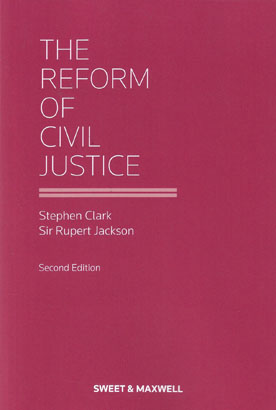The Reform of Civil Justice 2nd ed
ISBN13: 9780414067035
Published: March 2018
Publisher: Sweet & Maxwell Ltd
Country of Publication: UK
Format: Paperback
The Reform of Civil Justice provides a concise explanation of the 2013 Jackson civil justice and costs reforms, ensuring practitioners can find clear and practical guidance on how they fit together.
Co-authored by Sir Rupert (formerly Lord Justice) Jackson himself, along with barrister Stephen Clark, it offers a first-hand record of what the reforms aimed to achieve and a review of their success to date, drawing lessons from the process.
This second edition has been updated to include:
coverage of Sir Rupert Jackson’s significant 2017 report on recoverable costs, which considers measures to extend fixed rate costs into parts of the multi-track;
a fuller discussion of civil justice reform projects before the twenty-first century;
an account of the post-Jackson reform projects, in particular the Briggs Reports and the Courts Modernisation Programme; and
coverage of other recent developments in costs management.
The Reform of Civil Justice
is an ideal resource for all those who require an in-depth yet succinct insight into the most prominent and important reforms to civil litigation since the Woolf Reforms. As the new Foreword by the Lord Chief Justice, Lord Burnett of Maldon, notes:
“Any work on the reform of civil justice that can trace the inherent difficulties back to Aristotle and arrive at the court reform programme via Thomas Aquinas, Sir Matthew Hale and Bentham (as well as the more conventional historical series of inquiries) does more than demonstrate learning but will stimulate thought and also entertain.”
Stephen Clark is a Barrister of the Inner Temple.
The Right Honourable Sir Rupert Jackson is a former Lord Justice of Appeal.
- Provides a concise explanation of the 2013 Jackson civil justice and costs reforms, ensuring practitioners can find clear and practical guidance on how they fit together.
- Co-authored by Sir Rupert (formerly Lord Justice) Jackson himself, along with barrister Stephen Clark.
Offers a first-hand record of what the reforms aimed to achieve and a review of their success to date, drawing lessons from the process.
- Guides readers through tricky areas of the reforms, from DBAs and QOCs to the role of ADR and the new procedures for detailed assessment.
- Explains the changes that were required to funding, particularly conditional fee agreements, after-the-event insurance and damages-based agreements.
- Emphasises consensual settlement and ADR, and analyses Part 36 offers.
- Contributes to the ongoing debate about contentious issues such as hybrid damages-based-agreements and fixed costs.
- Includes a diagram clarifying the interrelationship of the Jackson reforms.
- Of invaluable assistance to practitioners in particular and also to students.
- Constitutes a permanent record of the reforms to stand the test of time.
- Exists as a companion volume to Costs & Funding following the Civil Justice Reforms: Questions & Answers, published in conjunction with Practical Law (now in its 4th edition).
- Updated to include coverage of Sir Rupert (formerly Lord Justice) Jackson's significant 2017 report on recoverable costs, which considers measures to extend fixed rate costs into parts of the multi-track.
- A fuller discussion of civil justice reform projects before the twenty-first century.
- An account of the post-Jackson reform projects, in particular the Briggs Reports and the Courts Modernisation Programme.
- Coverage of other recent developments in costs management.
- Now co-authored by barrister Stephen Clark.
